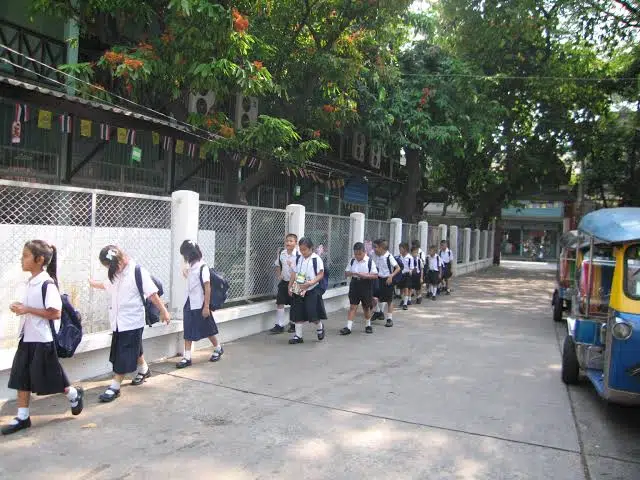Thailand is one of the most popular places to teach English. As the world becomes more globalised than ever, the need to learn English increases and Thailand is looking to catch up as much as everyone else. Therefore, a teaching job in Thailand is an incredible opportunity. Besides helping Thai students learn a new language, it’s your chance to experience a different culture and build your C.V. If you are to get the most from a TEFL job in Thailand, know what to expect.
No two individuals have the same experiences, but you should have some basic information about what it means to take that teaching position in Thailand. Despite the training you received during your TEFL course, you can’t be fully confident that the process will be smooth sailing. Understanding a few things can save you a lot of trouble.
Do People Speak English in Thailand?
Before packing for your trip to that new teaching job in Thailand, you might have one question. Do they speak English in Thailand? Never assume anything when planning to spend time in a foreign place. Central Thai (or Thai) is the national and official language. However, basic English is widely used in major cities. Thailand is a top tourist destination, and Bangkok handles a fair amount of businesses. For these reasons, the use of English for communication is becoming more widespread.
The extent of English spoken by the people depends on the place. In the capital, for example, you will find that some students have a basic understanding of English, giving you somewhere to start. In other areas like the remote communities, you can have students who only know a few words of the language.
However, just because some people in Thailand speak English doesn’t mean that you can communicate with them smoothly. It can be hard to comprehend a non-native speaker due to a heavy accent and poor pronunciation. You might find a teacher or two who can interact in English, depending on the calibre of the staff.
Do I Have to Speak Thai in The Classroom?
Most schools require English teachers to only speak English to students. The point is to have pupils get used to hearing and speaking the language. It’s an effective strategy, but sometimes it may not always work. Take, for instance, a class of students with no prior teaching of English. What do you do when you want to instruct a person to carry out a task or need to explain something comprehensively?
Cards with pictures help a great deal when teaching English in Thai high school. However, they might not be effective in some cases. Learning basic Thai expressions and using them in class can be a crucial part of the teaching process. Therefore, before showing up at school, grasp a few important phrases and words that you think might be handy in your class.
Problems with Teaching in Thailand?
Teachers face different issues when teaching English in Thailand. Knowing some of them will help you prepare and think of solutions that work best for you.
- Most high school students might be able to read on a basic level, but speaking and listening are the biggest challenges. It helps to organise lessons that assist students immerse themselves in the English language. ESL teachers have games that focus on speaking and listening skills.
- If you end up in a remote community, you could have students who don’t recognise the importance of learning English. Students who don’t plan to join colleges or already have a family business waiting might not show much interest in acquiring a second language. Teaching English to such students can be frustrating. Try to make the language classes as fun as possible. It also helps if pupils can understand the opportunities that come with knowing how to communicate in English.
- High schools in Thailand focus a lot on grades, and that can have some negative impact when learning a foreign language. Students should be aware of their weaknesses and what they are doing wrong. Ensure that your pupils have the necessary guidance to enhance their English skills.
How are Thai High schools and Thai Students Like?
Where you land to teach English in Thailand is fundamental. The Thai public school system operates differently from private institutions, which means you can expect varying experiences.
About Thai Schools:
- A public school receives funding from the government, and so might not have many resources to offer teachers. It might be necessary to get a little creative with your lesson planning to utilise what is available without shortchanging the students. Also, expect to have large classes with up to 30 or more students.
- Private schools have a bit more to work with, meaning teachers have more resources at their disposal. The hours, ratio of students to teachers and salary are better than in public schools. You might also have more foreign teachers in the school to interact with.
- International schools In Thailand, as with everywhere else, are all about exclusivity. Here, you will find the most qualified TEFL teachers. You can have less than 10 students in your class.
Whatever the school, you might have to teach more than just English. Some ESL teachers end up with three or four different subjects on their lesson plans. Usually, this happens in situations where a school doesn’t have enough teachers, and a school wants to incorporate English into more subjects.
What about Thai students?
You will find that most Thai high school students are eager to learn English. The ability to communicate in English is a big positive for young adults who are preparing to join colleges and the job market. Students are not so shy about wanting to improve their writing and speaking skills.
Of course, be prepared to encounter a tough case here and there. Come up with ideas of how to teach English in Thailand to all the students under your care. Depending on the school and location, you can come across all kinds of students. You could end up at an international school where the children are from some of the wealthiest families in the country or a small village school where you get to educate underprivileged students.
Final Words
If you want to teach English in Thailand, educate yourself on everything that matters. Look up testimonials from TEFL teachers from different parts of the country. Know some of the common challenges that English teachers encounter. Remember that Thai culture can be astronomically different from what you are used to. Find out about the dress code for foreign teachers because every school usually has one. The rule is to keep it conservative. Ask about interactions with locals to know what is acceptable and what isn’t. Do what you can to make your stay in Thailand as pleasant as possible.


